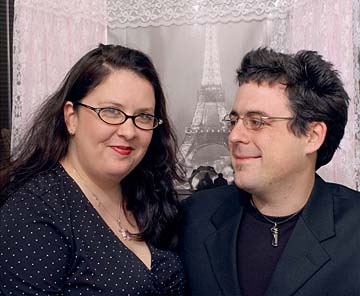
KEN IGE / KIGE@STARBULLETIN.COM
For some mainland tourists, even a trip to Hawaii is becoming too far to travel.
Jennifer Hill and her fiance, all set for a honeymoon in Paris, have decided to swap baguettes on the Left Bank for a Wayne Newton concert in Las Vegas because of the war in Iraq. Home Safe
Between SARS and terror,
Kamaaina spending overlooked
travelers stick to the familiarBy Gary Gentile
Associated PressThey'll still have Paris after Saturday's nuptials, but it will be the Paris hotel in Las Vegas.
"I don't care if it's half the size, we're going to see an Eiffel tower," said Hill, the 33-year-old owner of a communications firm in Austin, Texas.
Tourism experts say more and more Americans are having second thoughts about traveling too far from home, a trend expected to worsen if the war drags on. For some, even Hawaii is too far to travel, with the wartime slump prompting island hotels and tourist shops to work on attracting more local residents.
"We're starting to see long-term overseas flyers kind of pulling in their horns and going for domestic or safer locations," said Stan Morse, owner of Marstan Travel in Millbrook, N.Y. "We think domestic flyers have trended toward driving vacations. It's a cascading effect that has been going on for a while."
In Hawaii, hotel chains have been running ads offering discounts to local residents. Island industry officials don't expect that will make up for big losses in Asian and mainland travelers, but the strategy is viewed as a hedge against a declining travel market.
(The combination of the war and the outbreak of severe acute respiratory syndrome have led to a fear of flying in Japan, which is the second largest source of Hawaii's 6.4 million annual tourists. The result has been a roughly 40 percent loss in Japanese business, at a time when the industry is still recovering from the effects of Sept. 11, 2001, and faces continuing weakness in the Japanese economy.
(Domestic business is also taking a hit. Hilton Hawaiian Village, Waikiki's largest hotel, said yesterday its mainland business is down 15 percent.)
Already reeling from the 2001 terrorist attacks and a global economic slump, airlines are facing even tougher times as war dominates the news.
ASSOCIATED PRESS
Due to jitters caused by seeing French anti-war demonstrations on television, Jennifer Hill and her fiance, Fritz Robenalt, canceled their Paris honeymoon plans and instead opted to celebrate their marriage at the Paris hotel in Las Vegas.
Domestic air travel bookings for the next 60 to 90 days have fallen by 20 percent, while international bookings for the same period are down by 40 percent, according to the Air Transport Association trade group.
The industry's latest jolt is the worldwide scare posed by SARS, the mysterious illness first reported in Asia that has spread to a number of other countries, including the United States. Just this week, for example, the illness prompted Intel Corp. to pull out of shows in China and Taiwan.
"With all the disasters that have befallen us -- 9-11, Iraq and now SARS -- it's a terrific problem," said Gary Wilson, chairman of Northwest Airlines. "We're trying to conserve as much cash as we can under the theory that the last man standing is going to survive."
Airlines and hotels are reporting cancellations as tour operators scramble to find alternatives for jittery travelers. Meanwhile, vacation spots that rely on drive-in traffic expect to be busier in the coming months.
Ken and Maria Garrison of Schenectady, N.Y., were set to celebrate their 25th anniversary on a 10-day trip to Italy with their 21-year-old daughter, Kelly. He canceled the night before their planned March 21 departure after seeing televised reports showing thousands of protesters at the airport in Rome and other Italian cities.
"We're not going to go there with a camera strapped around our neck," Ken Garrison said.
Instead, he and his wife spent two nights at an inn in Vermont. They lost $5,300 by canceling their Italy trip, but Garrison said it was the right move.
For Hill, the decision to change honeymoon plans "was sealed when we started seeing protests in Paris."
"With the 'Yankee go home' signs, there's just a general feeling of unease," she said. "You don't need that kind of feeling on your honeymoon."
Analysts said the impact on tourism will be devastating if the war drags into summer, typically the busiest travel season.
"I think we're going to see a falloff initially," said Bjorn Hanson, lodging industry consultant at PriceWaterhouse Coopers. "I think we'll see less falloff as time goes on unless there is bad news, such as some kind of retribution against American interests, that causes people to worry about their personal safety or being stranded or delays at airports."
Hanson sampled hotels in major cities recently and found more than 20 percent of reservations for arrival in the upcoming seven days had been canceled.
Cancellations continue to outpace bookings in those cities, he said.
Some people are taking advantage of bargains and relaxed cancellation policies to ditch costly reservations made months ago.

